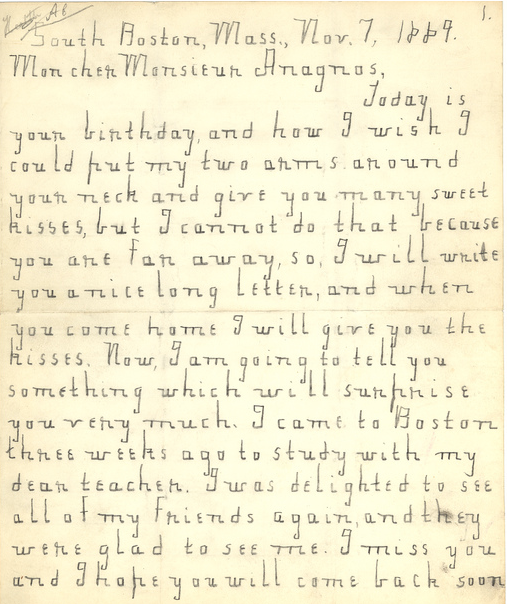
Image by Flickr, courtesy of Perkins School for the Blind
The inspirational blind and deaf activist and educator Helen Keller learned to speak aloud, but, to her great regret, never clearly.
Her careful penmanship, above, is another matter. Her impeccably rendered upright hand puts that of a great many sighted people—not all of them physicians—to shame.
Keller learned to write—and read—with the help of embossed books as a student at Perkins School for the Blind. The United States didn’t adopt Standard Braille as its official system for blind readers and writers until 1918, when Keller was in her late 30’s. Prior to that blind readers and writers were subjected to a number of competing systems, a situation she decried as “absurd.”
Some of these systems had their basis in the Roman alphabet, including Boston Line Type, the brainchild of Perkins’ Founding Director, Samuel Gridley Howe, an opponent of Braille. Students may have preferred dot-based systems for taking notes and writing letters, but Boston Line Type remained Perkins’ approved printing system until 1908.
There’s more than an echo of Boston Line Type in Keller’s blocky characters, as well as her spacing. Deviating from penmanship forms learned at school is a luxury exclusive to the sighted. Until formation became instinctual, Keller relied on a grooved board to help her size her characters correctly, an exhausting process. Small wonder that she ended many of her early letters with “I am too tired to write more.”
Perkins has published a Flickr album of letters Keller wrote between the ages of 8 and 11 to then-director Michael Anagnos, including 3 pages in French. Leafing through them, I marveled less at her ability and determination than my (sighted) 16-year-old son’s lack of interest in developing a respectable-looking hand.
Keller’s handwriting is so above reproach that it quickly fades to the background, upstaged by her charming manners and girlish preoccupations. A sample:
If you go to Roumania, please ask the good queen Elizabeth about her little invalid brother and tell her that I am very sorry that her darling little girl died. I should like to send a kiss to Vittorio, the little prince of Naples, but teacher says she is afraid you will not remember so many messages.
Browse Perkins’ collection of Keller’s handwritten letters to Michael Anagnos here.
Related Content:
Helen Keller Speaks About Her Greatest Regret — Never Mastering Speech
Ayun Halliday is an author, illustrator, theater maker and winemaker who played Annie Sullivan in her high school’s production of The Miracle Worker. Follow her @AyunHalliday.


Not being able to see, yet write so brilliantly really makes one wonder about how our technology may be distracting young minds. This may be an interesting research topic.